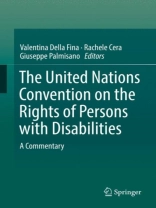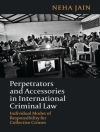This Commentary provides the first comprehensive legal article-by-article analysis of the provisions of the Convention on the Rights of Persons with Disabilities (CRPD). The Convention is the key international human rights instrument exclusively devoted to persons with disabilities and the centerpiece of international efforts to address inequalities and barriers they encounter to the full enjoyment of human rights. The book discusses the Convention’s position within existing international human rights law and within the framework of the United Nations measures to protect the rights of people with disabilities.
Starting with the background of all the Convention’s articles, including the travaux préparatoires, this Commentary examines each provision’s substance and interpretation, and explores the significance of each right, its legal scope and relationship with other international legal norms and principles. A unique contribution also analyzes the Optional Protocol to the Convention. In addition to enriching academic studies of international human rights law, the book provides insights into the practical operation of the Convention’s provisions by assessing the practice of the CRPD Committee, the activities of relevant international and regional human rights bodies in enforcing the rights of persons with disabilities and the contracting parties’ implementation practices. Relevant European Court of Human Rights, the Court of Justice of the European Union and, if appropriate, other regional jurisdictions’ case law, as well as the jurisprudence of domestic courts, are taken into consideration.
Contributions from leading scholars and international experts make this book an indispensable resource for lawyers, academics, students, journalists, international organizations, NGOs and other stakeholders wanting to better understand the rights of people with disabilities. Furthermore, it makes a valuable contribution to appraising the impact of the Convention in the legal orders of contracting parties and to charting the way forward in the protection of the rights of persons with disabilities.
Table of Content
From Invisible Citizens to Agents of Change: A Short History of the Struggle for the Recognition of the Rights of Persons with Disabilities at the United Nations, Theresia Degener and Andrew Begg.- A New Human Rights Model of Disability, Theresia Degener.- The European Union and the Convention on the Rights of Persons with Disabilities: Complexities, Challenges and Opportunities, Anna Lawson.- Preamble, Rachele Cera.- Article 1 [Purpose], Valentina Della Fina.- Article 2 [Definitions], Rachele Cera.- Article 3 [General Principles], Valentina Della Fina.- Article 4 [General Obligations], Valentina Della Fina.- Article 5 [Equality and Non-discrimination], Rachele Cera.- Article 6 [Women with Disabilities], Valentina Della Fina.- Article 7 [Children with Disabilities], Andrea Broderick.- Article 8 [Awareness-raising], Aurélie Baranger.- Article 9 [Accessibility], Francesco Seatzu.- Article 10 [Right to Life], Giovanni Carlo Bruno.- Article 11 [Situations of Risk and Humanitarian Emergencies], Giovanni Carlo Bruno.- Article 12 [Equal Recognition Before the Law], Mary Keys.- Article 13 [Access to Justice], Eilionóir Flynn.- Article 14 [Liberty and Security of the Person], Francesco Seatzu.- Article 15 [Freedom from Torture and Cruel, Inhuman or Degrading Treatment or Punishment], Antonio Marchesi.- Article 16 [Freedom from Exploitation, Violence and Abuse], Antonio Marchesi.- Article 17 [Physical and Mental Integrity], Mary Keys.- Article 18 [Liberty of Movement and Nationality], Rachele Cera.- Article 19 [Living Independently and Being Included in the Community], Giuseppe Palmisano.- Article 20 [Personal Mobility], Marco Fasciglione.- Article 21 [Freedom of Expression and Opinion, and Access to Information], Rachele Cera.- Article 22 [Respect for Privacy], Valentina Della Fina.- Article 23 [Respect for Home and the Family], Valentina Della Fina.- Article 24 [Education], Valentina Della Fina.- Article 25 [Right to Health], Ilja Richard Pavone.- Article26 [Habilitation and Rehabilitation], Ilja Richard Pavone.- Article 27 [Work and Employment], Maria Ventegodt Liisberg.- Article 28 [Adequate Standard of Living and Social Protection], Marco Fasciglione.- Article 29 [Participation in Political and Public Life], Rachele Cera.- Article 30 [Participation in Cultural Life, Recreation, Leisure and Sport], Luigino Manca.- Article 31 [Statistics and Data Collection], Mads Pedersen.- Article 32 [International Cooperation], Valentina Della Fina.- Article 33 [National Implementation and Monitoring], Luigino Manca.- Article 34 [Committee on the Rights of Persons with Disabilities], Article 35 [Reports by States Parties], Article 36 [Consideration of Reports], Ornella Ferrajolo.- Article 37 [Cooperation with States Parties and the Committee], Silvana Moscatelli.- Article 38 [Relationship of the Committee with Other Bodies], Silvana Moscatelli.- Article 39 [Report of the Committee], Rosita Forastiero.- Article 40 [Conference of States Parties], Ilja Richard Pavone.- Article 41 [Depositary], Article 42 [Signature], Article 43 [Consent to Be Bound], Andrea Crescenzi.- Article 44 [Regional Integration Organizations], Rosita Forastiero.- Article 45 [Entry into Force], Article 46 [Reservations], Article 47 [Amendments], Article 48 [Denunciation], Article 49 [Accessible Format], Article50 [Authentic Texts], Andrea Crescenzi.- Optional Protocol to the Convention on the Rights of Persons with Disabilities, Ornella Ferrajolo.- Charting the Development of Human Rights Law through the CRPD, Janet E. Lord and Michael Ashley Stein.
About the author
Valentina Della Fina is senior researcher in international law at the Institute for International Legal Studies of the National Research Council of Italy (ISGI-CNR). She holds a Ph.D. in law of international organizations from University of Teramo. She has a consolidated scientific background in the fields of international human rights law, disability rights, and law of international organizations. She is co-editor of the book La Convenzione delle Nazioni Unite sui diritti delle persone con disabilità. Commentario (Aracne, Roma, 2010) and managed the EU Project Promoting Equal Rights for People with Autism in the Field of Employment and Education.
Rachele Cera is researcher at the Institute for International Legal Studies of the National Research Council of Italy (ISGI-CNR), with a specialization in the field of international cooperation and legal protection of vulnerable people. She took part in all ISGI researches on the legal protectionof persons with disabilities and co-managed the EU Project Promoting Equal Rights for People with Autism in the Field of Employment and Education. She is author of publications on disability rights, and co-editor of the book La Convenzione delle Nazioni Unite sui diritti delle persone con disabilità. Commentario (Aracne, Roma, 2010).
Giuseppe Palmisano is director of the Institute for International Legal Studies of the National Research Council of Italy (ISGI-CNR). He is full professor of international law and president of the European Committee of Social Rights (Council of Europe). His research activities focus mainly on international human rights, in particular social rights.












